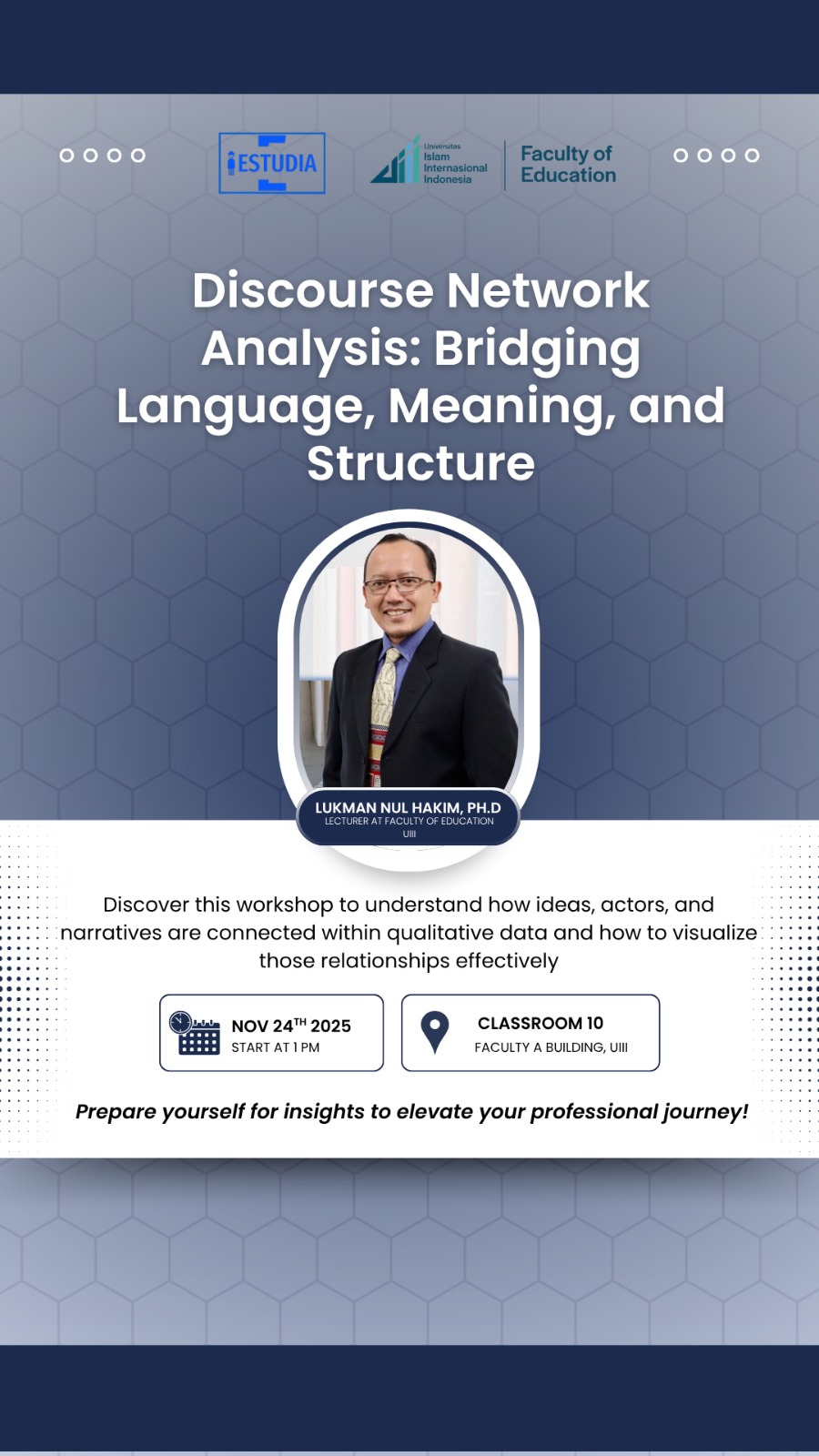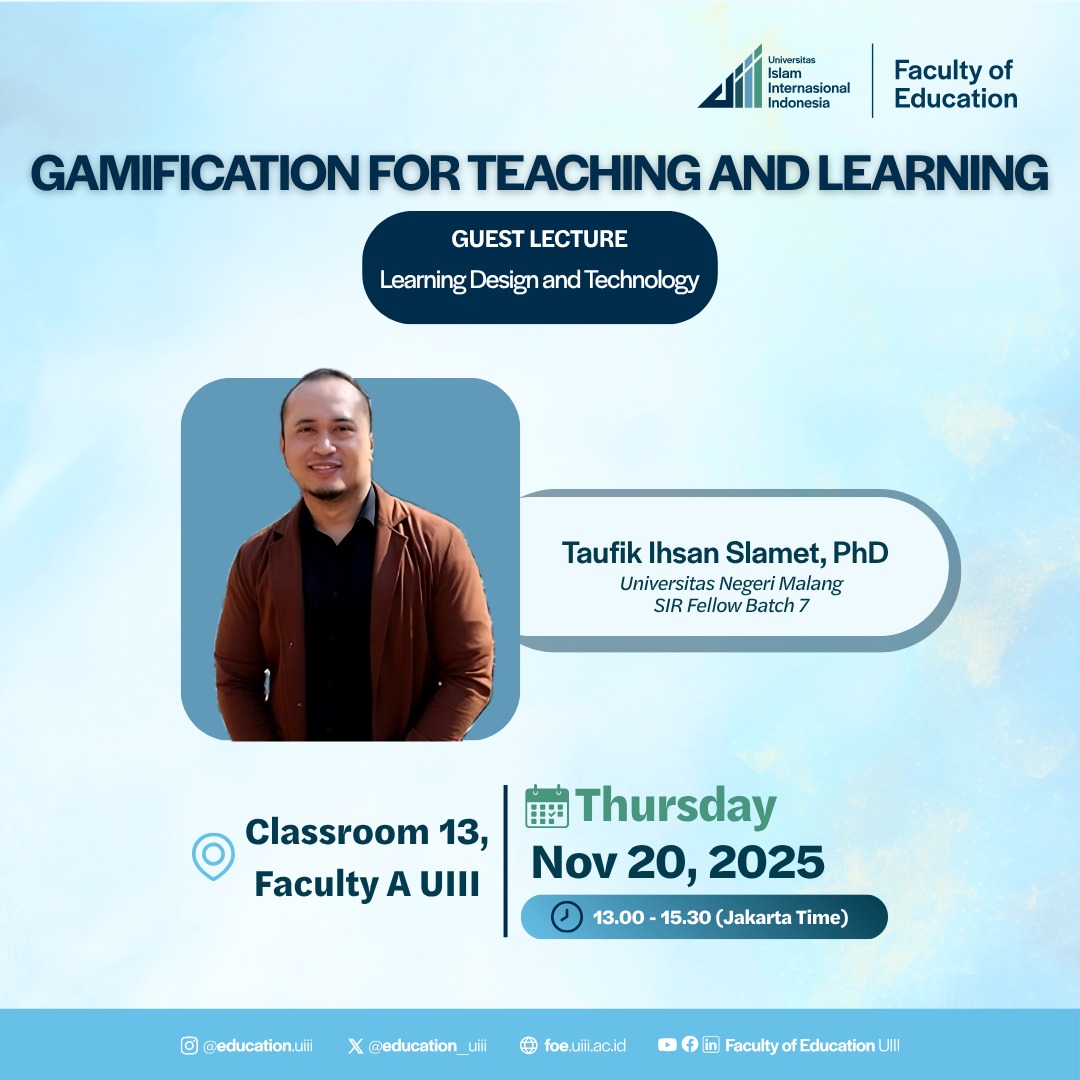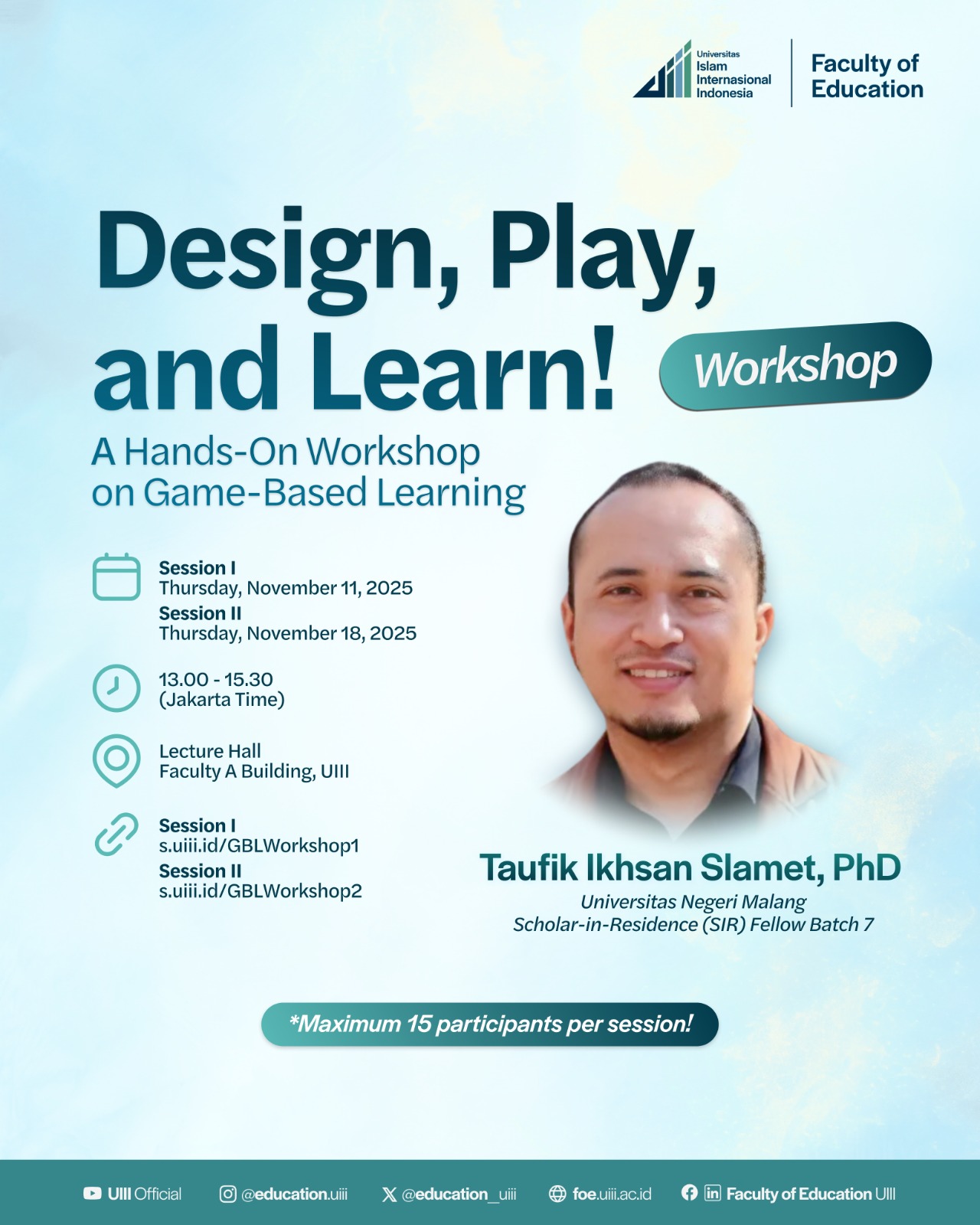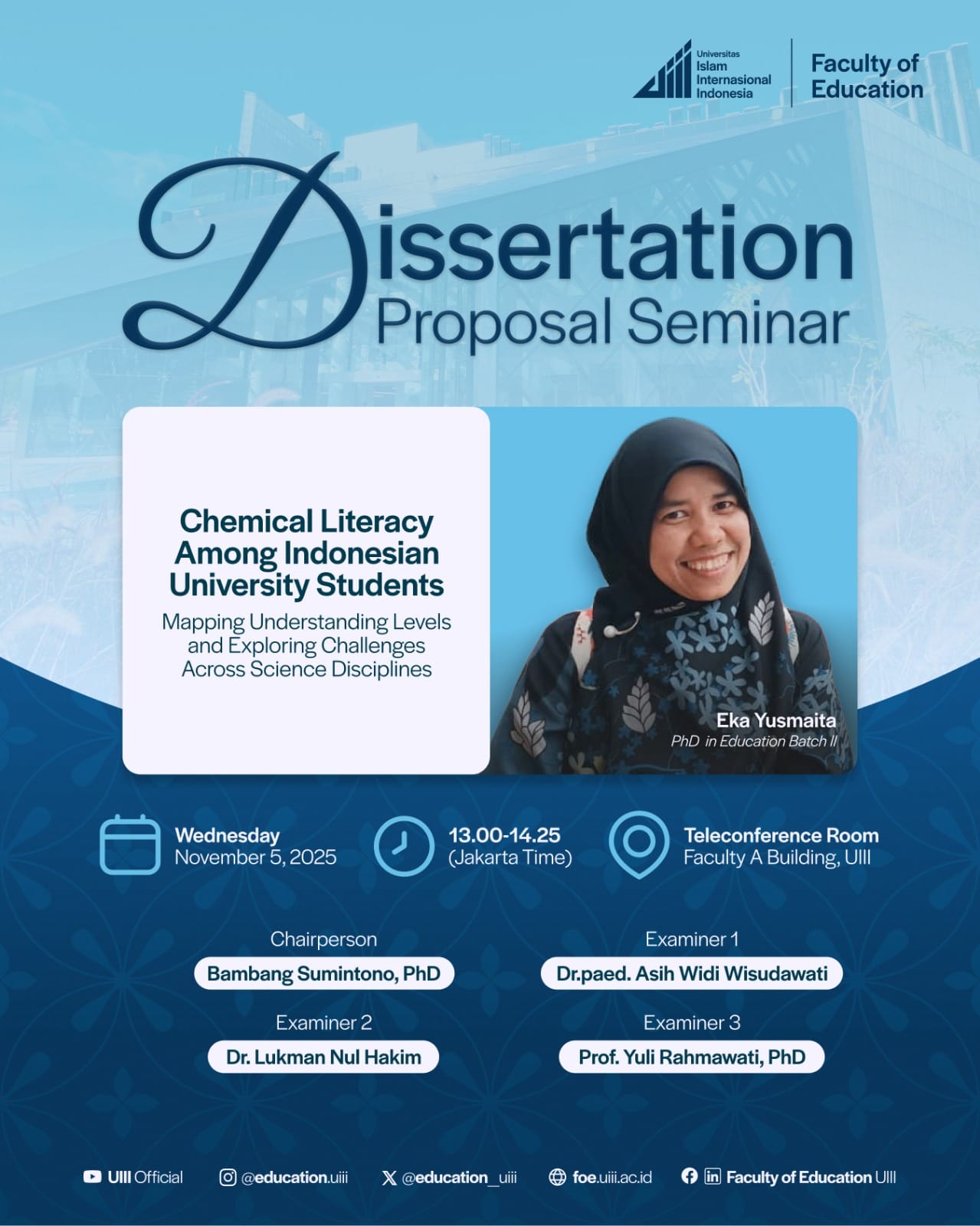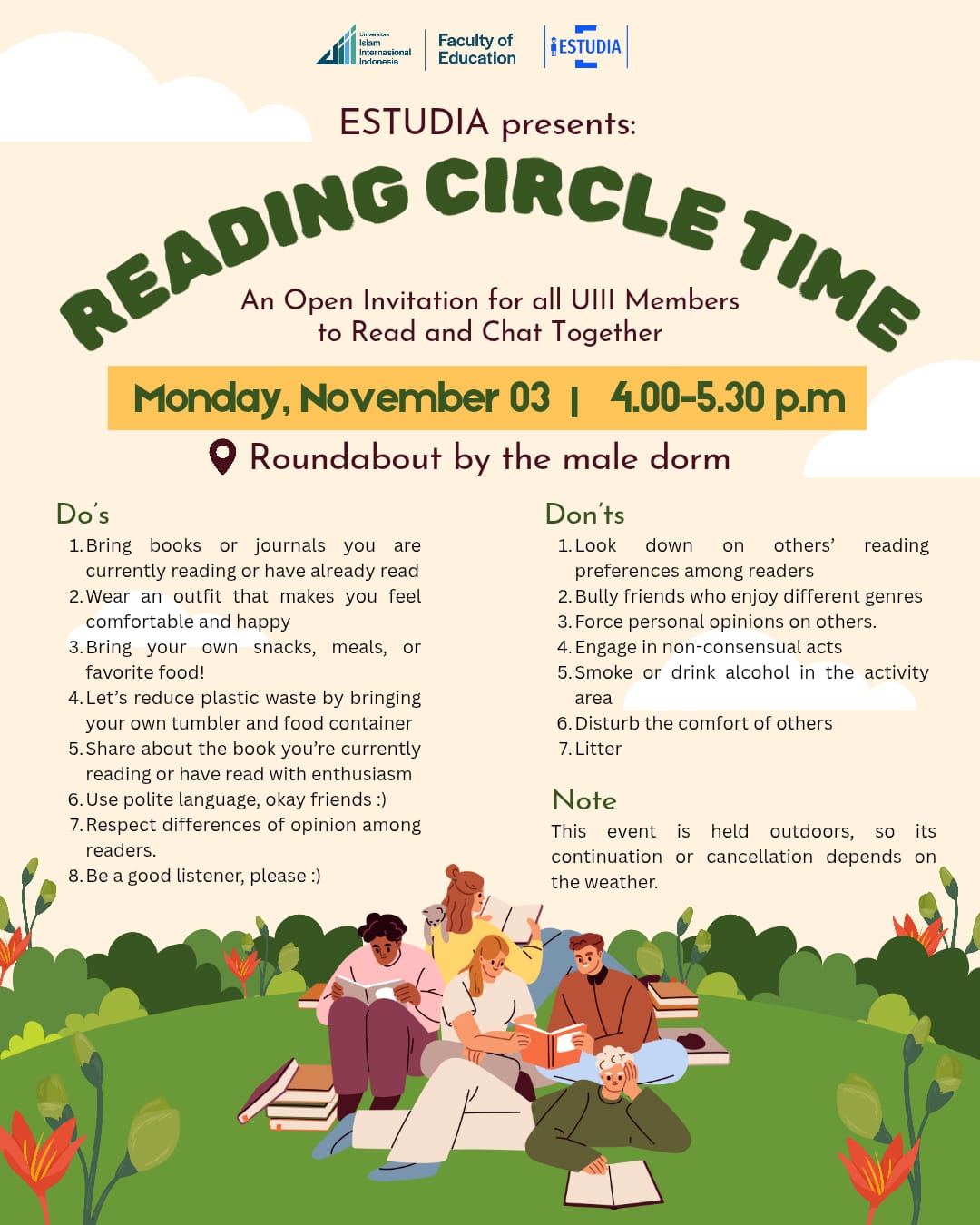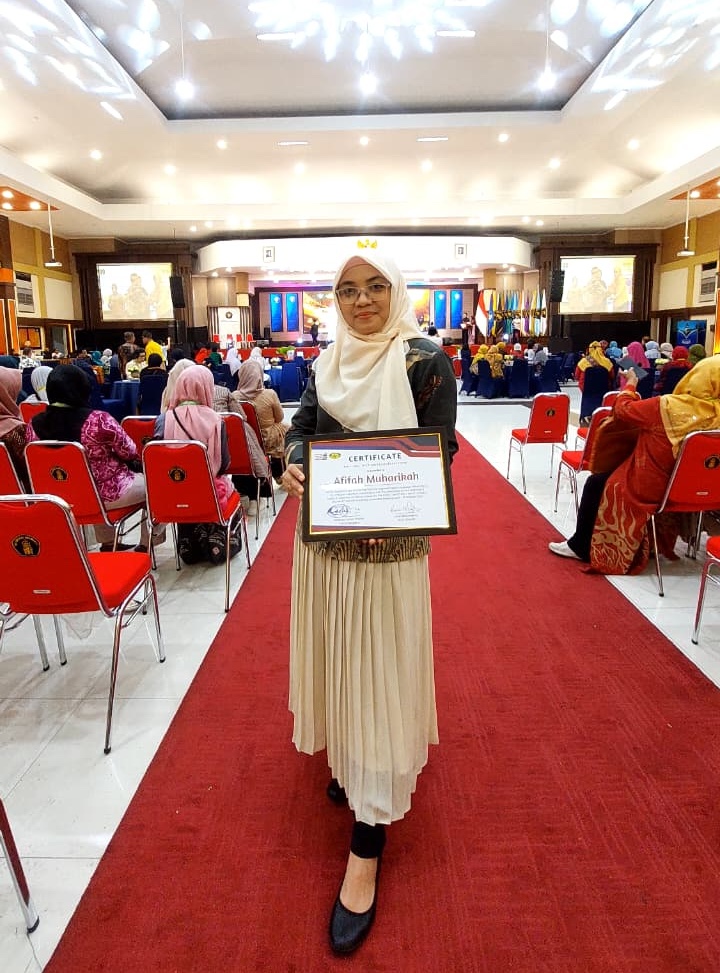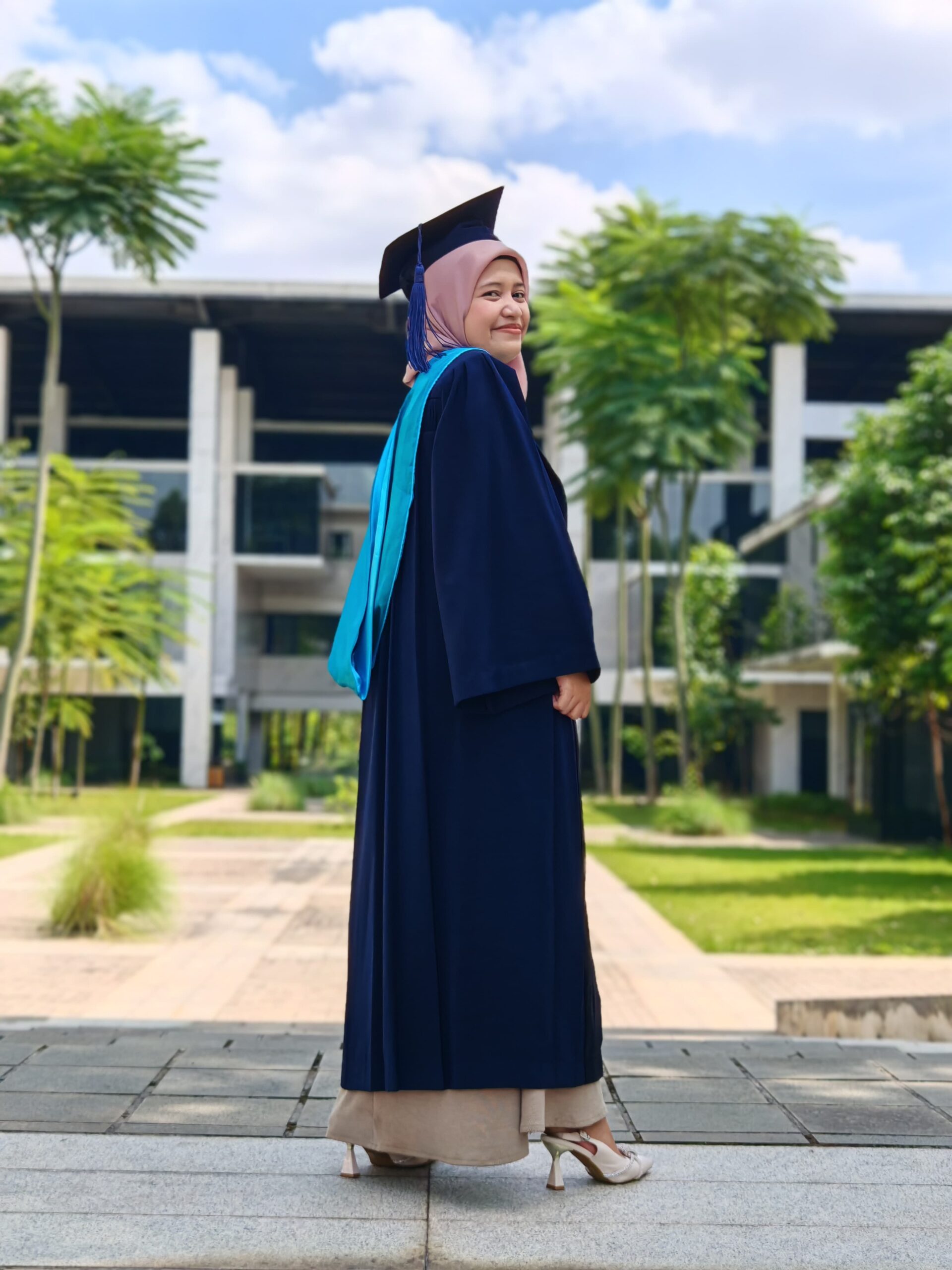In the Light of Small Steps: A Journey of Learning, Sharing, and Becoming
 In the Light of Small Steps: A Journey of Learning, Sharing, and Becoming
In the Light of Small Steps: A Journey of Learning, Sharing, and Becoming
By Luqyana Azmiya Putri
It is a great blessing for me to have the opportunity to be exposed to UIII community. How could it not be, when every moment I spend in the classroom and outside the classroom always leads me to continue sharing my knowledge. Just like my lecturers, who always strive and ensure that their knowledge reaches their students.
Fortunately, from August to September 2025, I had the opportunity to interact with one of the campuses in Jambi Province, specifically IAIN (State Islamic Institute) Kerinci. I had the opportunity to be a mentor for students at IAIN Kerinci to learn about the world of research together. I am very grateful for the meaningful opportunity at the Indonesian International Islamic University, where learning from my inspiring lecturers has made me want to follow in their footsteps. Long before the mentoring period, I intended to run an impactful university project in Kerinci. Aware of my limitations, I tried to realize this project with the support of the campus through the Community Engagement program.
The Community Engagement Program is a UIII initiative focused on providing support for implementing impactful programs. I tried to discuss this project and get guidance and direction from one of my lecturers who has extensive experience in this field. She is Prof. Suwarsih Madya, PhD. She is also the Team Leader of our project. We discussed the project execution plan, which focuses on providing a Research Clinic to each selected participant from IAIN Kerinci, followed by a Symposium as the culminating event.
 The Rector of IAIN Kerinci, Dr. Jafar Ahmad, M.Si, provided tremendous support and welcome for this program because it is in line with the campus's mission to improve student literacy skills, including in the fields of research and publication. For me, this support is not only a representation of institutional participation but also a form of inter-university collaboration. This activity seeks to show that the academic world is not a vertical line but a circle and network of ideas that reinforce each other. Through this collaboration, a space for collaboration has been created between UIII and IAIN Kerinci as learning partners who give, learn, and work together in building a culture of research.
The Rector of IAIN Kerinci, Dr. Jafar Ahmad, M.Si, provided tremendous support and welcome for this program because it is in line with the campus's mission to improve student literacy skills, including in the fields of research and publication. For me, this support is not only a representation of institutional participation but also a form of inter-university collaboration. This activity seeks to show that the academic world is not a vertical line but a circle and network of ideas that reinforce each other. Through this collaboration, a space for collaboration has been created between UIII and IAIN Kerinci as learning partners who give, learn, and work together in building a culture of research.
The mentoring program at the Research Clinic was held from August 26, 2025, to September 11, 2025. This program opened opportunities for all members of IAIN Kerinci to participate in this activity. More than 30 people registered for this program between August 21 and 23, 2025. Meanwhile, 25 participants from various disciplines were selected to participate in the mentoring program, including undergraduate students from the Faculty of Tarbiyah, Faculty of Sharia, Faculty of Economics and Islamic Business, and Faculty of Ushuluddin, Adab, and Dakwah. In addition, postgraduate students were also selected to participate in this program.
Research clinic participants can choose the material they want to study and also adjust it to the development of the research draft that has been prepared. This clinic-based mentoring system has become a way to accelerate participants in completing their full papers. Each participant attends at least 6 meetings where, at each meeting, participants are guided with a one-on-one approach, thereby increasing the opportunity to better understand the material presented. This strategy is inspired by the personalized learning approach, which tends to tailor the educational process to the needs of each student.
The priority of this program is to help students overcome difficulties in writing papers. Some of the problems encountered are related to research logic, writing coherence, data interpretation, and understanding of both qualitative and quantitative research methods. Each problem raised by participants is discussed and then intensively guided by providing understanding and material sourced from primary and relevant references.
After the mentoring period, 24 participants successfully completed their full papers and were able to proceed to the submission stage at reputable scientific journals. All participants who completed their papers had the opportunity to become presenters at the highlight of the event, namely the Symposium held on September 13-14, 2025. A total of 15 presenters registered to present their research results at the open panel session.
This experience shaped my perception that the learning process does not stop in the classroom, but that knowledge becomes more meaningful when shared with others. The research clinic activity, followed by the symposium, gave me the valuable understanding that everyone has a unique way of learning. This led me to discover the art of learning, that teaching is inseparable from understanding people, so it is not just about understanding the material. This understanding reminded me of Carl Rogers' view of humanistic pedagogy, which is related to the student-centered approach in learning. He revealed how humans have different potentials, accompanied by diverse learning needs for everyone.
I believe that fostering a culture of research is one of the best ways to bring knowledge to life. This is because individuals involved in this culture will be exposed to a variety of reading experiences. Not only reading academic literature, but also reading nature, which means that individuals involved have the potential to interpret events and phenomena that occur in the midst of human life in order to gain understanding and knowledge. This can be seen from the various topics raised and discussed in each student's paper. Among the topics discussed were education, social issues, religion, family law, history, and local tradition studies.
 This program made me realize that building a culture of research is not just about writing skills, but also the willingness and courage to think critically. Bringing meaning and sharing benefits does not have to wait until we become great people. After all, haven't we heard the sacred saying, “convey even if it is only one verse”? When contextualized in the learning journey, conveying the knowledge that has been learned is a way to actualize it. Of course, with the caveat that when conveying this knowledge, it must be accountable.
This program made me realize that building a culture of research is not just about writing skills, but also the willingness and courage to think critically. Bringing meaning and sharing benefits does not have to wait until we become great people. After all, haven't we heard the sacred saying, “convey even if it is only one verse”? When contextualized in the learning journey, conveying the knowledge that has been learned is a way to actualize it. Of course, with the caveat that when conveying this knowledge, it must be accountable.
Thus, a message emerges that academic and research activities are not merely targets for publication or numerical achievements. Rather, they are intellectual pursuits that reflect the small efforts made by every scholar to maintain the continuity of knowledge. I reflect on this activity as a space for mutual listening and mutual growth. This means that usefulness does not always arise and come from things that we often consider big, because it can also be born from a small space that moves on the basis of the awareness that knowledge is actually more meaningful when it is shared and brought to life.
Discourse Network Analysis Workshop: Bridging Language, Meaning and Structure

Discourse Network Analysis Workshop
Friendly reminder for the participants:
? Please install the required application before the workshop.
You can download it through the link below:
? https://drive.google.com/drive/folders/1i52g2HO6oUIbjkivEhFILU4vR5-qNm3t?usp=sharing
? Bring portable socket outlet if you have.
We look forward to seeing you on:
? Monday, 24 November 2025
? 13.00–15.00 (Jakarta Time)
? Classroom 10, Faculty of Education, UIII
Warm regards,
Academic & Research Estudia
? MOVIE TIME with ESTUDIA

? MOVIE TIME with ESTUDIA!
Join us for a cozy movie time watching Dead Poets Society, a timeless film that inspires reflection, courage, and critical thinking; values we uphold as UIII students.
✨ This event is open for all UIII students
? Friday, November 21, 2025
? 15:00 PM
? Theater, Faculty A – UIII
? Feel free to bring your own snacks!
Let’s take a short break from our busy academic rhythm and enjoy a meaningful story together—also a warm way to appreciate the spirit of National Teachers’ Day this month.
See you there and Carpe Diem!
Guest Lecture: Gamification for Teaching and Learning

Guest Lecture (Learning Design and Technologies)
with Taufik Ihsan Slamet, PhD
Topic: Gamification for Teaching and Learning
Day/Date: Thursday, 20 November 2025
Time: 13.00-15.30
Place: Classroom 13, Faculty A UIII
This lecture is open to FoE students
Design, Play, and Learn! A Hands-On Workshop on Game-Based Learning

Dear Students
We would like to inform you that the Faculty of Education, UIII, will conduct a workshop with the tittle: "Design, Play, and Learn! A Hands-On Workshop on Game-Based Learning" with Taufik Ikhsan Slamet, PhD.
Details:
Session 1
* Date: Tuesday, November 11, 2025
* Time: 13:00-15:30 (Jakarta Time)
* Place: Lecture Hall, Faculty A UIII
Session 2
* Date: Tuesday, November 18, 2025
* Time: 13:00-15:30 (Jakarta Time)
* Place: Lecture Hall, Faculty A UIII
Limited seats available!
To secure your seat, please fill out the Google Form linked below. Only the first 15 registrants will be accepted.
Link session 1: https://s.uiii.id/GBLWorkshop1
Link session 2: https://s.uiii.id/GBLWorkshop2
Thank you
Reading Circle Time with Estudia

?✨ Reading Circle Time with Estudia ✨?
We’re excited to announce the return of Reading Circle Time as the new semester begins! A special welcome to all new UIII students—this is the perfect chance to meet friends, relax, and share your favorite reads.
? When?
Monday, November 03
? What time?
4:00 – 4:30 p.m. Silent reading
4:30 – 5:30 p.m. Book discussion
? Where?
UIII roundabout by the male dorm
? Who can join?
- Open to all UIII civitas: students, faculty, and staff are welcome!
- New students—this is a great chance to meet friends and start your semester with inspiring conversations.
? What to bring?
- A book or journal you're currently into or have finished
- Snacks, meals, or your favorite treat
- Your tumbler and food container (let’s go green!)
- Comfy clothes that make you feel good
- Your bright smile and open mind ?
? Let’s create a space where everyone feels heard and appreciated. Be kind, be curious, and let the stories flow!
? Let’s read, share, and grow together—old and new friends alike
Guest Lecture: Digital Tools to Support Learning Designs

Guest Lecture (Learning Design and Technologies)
with Olivia Basrin from Google for Education Indonesia Country Lead
Topic: Digital Tools to Support Learning Designs
Day/Date: Friday, 31 October 2025
Time: 13.30-16.00
Place: Classroom 16, Faculty A UIII
This lecture is open for FoE students
UIII Lecturer Receives Prestigious U.S. Embassy’s RELO Scholarship Award at TEFLIN 2025

UIII Lecturer Receives Prestigious U.S. Embassy’s RELO Scholarship Award at TEFLIN 2025
October 16, 2025
Contributor: Supriyono | Photo: Afifah Muharikah
Afifah Muharikah, PhD, a lecturer at the Faculty of Education, Universitas Islam Internasional Indonesia (UIII), has been honored with the prestigious RELO Scholarship Award 2025 during the 71st International Conference of TEFLIN (The Association for the Teaching of English in Indonesia)—one of Indonesia’s most prominent gatherings for English language educators and researchers.
Held under the theme “Reimagining English Language Education in the Age of AI and Digital Transformation: Integrating Inclusive Education and Cultural Diversity,” this year’s TEFLIN conference attracted over 600 presenters and participants from Indonesia and abroad. The event serves as a vital platform for teachers, lecturers, and researchers to exchange ideas and innovations in English education, while fostering global collaboration with international professional networks.
Representing UIII’s Faculty of Education, Dr. Afifah joined the event as one of ten recipients of the RELO Scholarship 2025, an award jointly granted by the U.S. Embassy’s Regional English Language Office (RELO) and TEFLIN to recognize educators making meaningful contributions to English teaching and research in Indonesia.
“The award is very meaningful to me because it directly supports my Latsar CPNS (civil servant basic training) project at UIII,” said Dr. Afifah. “Under the guidance of Prof. Nina Nurmila, Dean of the Faculty of Education, I’m developing an AI Literacy Module for Research, which will later be integrated into the Thesis Preparation course and the Faculty’s Thesis Handbook.”
Throughout the three-day conference, Dr. Afifah participated in sessions that explored topics such as AI in academic writing, digital ethics, inclusive pedagogy, and intercultural communication. She also networked with educators and researchers from various universities and institutions across Indonesia, exchanging ideas about how AI and inclusivity are shaping English language education globally.
Her engagement extended beyond participation — she also took the opportunity to introduce UIII’s programs and share information about the Faculty of Education’s upcoming academic seminar in April 2026, which is currently calling for paper submissions.
“This conference allowed me to reconnect with the TEFL community after completing my PhD and to learn how current discussions on AI, inclusion, and accessibility are influencing English education,” she reflected. “It also helped me transition from practitioner to researcher and strengthen UIII’s academic visibility in the field.”

The RELO Scholarship Award 2025 marks a milestone in Dr. Afifah’s professional journey, following her involvement in previous TEFLIN and RELO-supported programs such as the TEFLIN Professional Development Program and the Developing and Teaching Academic Writing Course (DATAWC).
Dr. Afifah’s recognition not only enhances her personal capacity as an educator and researcher but also contributes to UIII’s broader mission of advancing ethical, inclusive, and globally informed scholarship. This award reflects UIII’s commitment to developing educators who are ethical, competent, and globally connected.
The Process Was Not Easy, but I Did It: A Thesis Writing Journey as an Outsider

The Process Was Not Easy, but I Did It: A Thesis Writing Journey as an Outsider
By Queen Salsabila
Writing a thesis is a final requirement for us, the last year students of Universitas Islam International Indonesia (UIII), to obtain our Master of Arts in Education degree. Writing it was not an easy task; we put our effort, spirit, and dedication into it. We all had our own struggles to finish it, and for me, doing it as an outsider made the journey even more challenging yet memorable. My thesis discusses the role of empathy as the mediator between the effect of collective teachers’ efficacy and school climate on the well-being of English teachers in the special region of Jakarta. As someone who was born, raised, and finished a bachelor’s degree in East Java, I had no personal connection with my field research site or its people when I began my research.
Some people may wonder why I did not make it easier by going to my hometown and doing the research there. However, after considering everything, particularly the uniqueness and diversity of culture in Jakarta, which will add special value for my research topic, I chose Jakarta as my research site. Thus, with that belief and support from my supervisors, I took the big risk of choosing Jakarta as my research site and put East Java as my second plan. This journey was full of self-doubt, fear, tears, and overthinking, but I kept going, believed that I would face it, and in the end, it was all worth it.
Along the way on this journey, despite all my doubts, I always believed that I could do it. At the first step, as an outsider, I had to build everything from scratch. In detail, because my research is quantitative, it requires a lot of participants. Thus, I began my journey by looking for any teacher who could help me become a research assistant. This process was not smooth, because my research participants are English teachers in Jakarta, I began by checking the Instagram account of the English Language Teachers Association (MGMP), but I could not find any active account. I continued my journey by asking some friends who became English teachers, through this way, I got one of the contacts of an English teacher, who is fortunately one of the treasures of MGMP in Pasar Minggu sub-district in South Jakarta. I went to her school to meet her and explain my research topic, and she agreed to be my research assistant.
Furthermore, to obtain legal permission, I went to the Jakarta Provincial Education Office to submit a research permit letter and request a research recommendation letter to conduct research in Jakarta. Eventough Jakarta is a province, buat actually it is a big metropolitan city, which also Indonesian capital. This process was going smoothly, and they were willing to help me in the process of data collection. Through this, my belief that I can complete this research has increased. However, this feeling did not last long. In the data collection process, it was hard for me to gain the data, even though I had already received help from my research assistant and the educational office to distribute my instrument. Realising that waiting would not help, I found another way. I am seeking help from a more impactful person in the field, who is the head of MGMP in DKI Jakarta, both in Junior and Senior High School. I met them to explain my research, my struggle, and to ask for help. During that meeting, I also got the contact number of the head of the School Principals’ work forum (MKKS), so I contacted and met him. Consequently, my data increased gradually.

Despite that, after weeks of waiting, I have not yet reached my target, while the submission deadline for finishing my research is approaching. A feeling of fear came over me, but I am not stopping here, I try another way. With the help of my best friend, Kak Nabila, I dedicated myself to taking a more direct approach. I visited several schools in person, and we went door to door around schools in Jakarta near Depok, waiting for hours to meet the teacher coordinator or principal. In this journey, I accepted both the warm welcome as well as some rejections. Continuing that, I did follow-ups every three days with the heads of the association, even joining their event to introduce myself, explain my research in the forum, and ask for their help to participate. I also contacted a hundred teachers. And finally, I meet my appropriate number of participants. This process taught me patience, humility, and empathy. I learned to respect every rejection and value the slow progress that builds my resilience.
More than that, the challenge is not stopping; the data analysis process is challenging, as is the data collection process. I made mistakes in my analysis, which led to repeating the analysis process. Here, I strive to continuously learn from my mistakes, which leads me to a deeper understanding about the research process and its analysis. From this journey, I believe that if there is a will, there will be a way. For someone who will follow my step, it will not be easy, but you should remember to be courageous, be persistent, never be tired of trying and learning, keep going even if it is a small step, and remember to believe that you can do it, while also having plan B. In the end, this journey not only shaped my research skills but also my character. It gave me valuable lessons that research could never teach. Lastly, thank you so much to everyone who helped me and supported me during this process, especially my supervisor, Assoc. Prof. Charyna Ayu Rizkyanti, PhD, who have always believed in me and guided me during this process. The Journey was not easy, but I made it.


